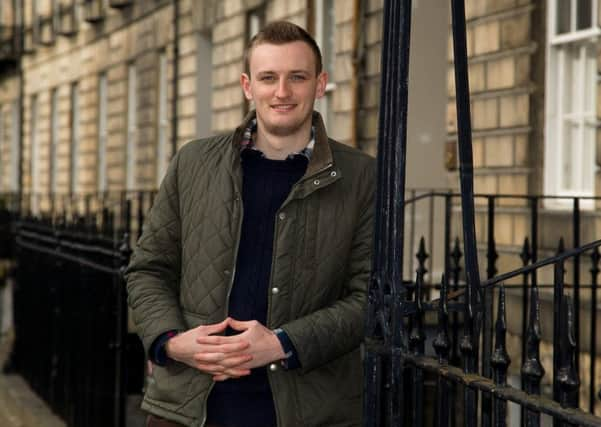Council plans crackdown on Airbnb in Edinburgh


An increasing number of homes across the city have opened to strangers since the popularity of hospitality service Airbnb has grown in the last year.
Dubbed a “community marketplace” the online service enables people to lease or rent their own homes as short-term accommodation in cities across the world. Incredibly, Airbnb is now said to be worth £1m a day to the Scottish economy - but it remains largely unregulated.
Advertisement
Hide AdAdvertisement
Hide AdThe city council is now planning to work with the Scottish Government to clamp down on planning laws in a bid to legislate against homeowners using Airbnb, and similar sites, to list a property for more than 90 days.
City councillors have highlighted community issues of over-concentration, public safety, waste collection, noise and community cohesion.
Planning committee vice-convenor Cllr Alex Lunn said: “Edinburgh takes the safety of visitors very seriously and obviously a lot of these visitors are staying in short-term lets.
“It’s our ambition to ensure our short-term lets have the same standard currently enjoyed by licensed Houses of Multiple Occupancy (HMO).
Advertisement
Hide AdAdvertisement
Hide Ad“Edinburgh already has some very successful working in this sector but we have to be concerned about the impact of unregulated corporations expanding.”
If successful, new legislation could mean homeowners wanting to list their property for more than 90 days would have to seek planning permission to change the use from residential to commercial.
Or if proposals are approved for a licensing or registration scheme, property owners would need to go through a licensing process similar to HMOs. Both outcomes could include a fee.
But, landlord Chris Young, 28, who lists his, normally long-term rental property in Tollcross, as a short-term Airbnb during the Festival said a change in property classification would impact his desire to continue using the service.
Advertisement
Hide AdAdvertisement
Hide AdHe said: “It’s not just the cost which would be a deterrent but the impact on longer term usage of the property.
“The Council may approve it to become a commercial property now, but who says in 10 years time they’ll approve a change back to residential use when I want to live in it myself or sell it on?
“If I’m stuck with a commercial use property it will reduce its value as buyers don’t know if they’ll get permission to change it therefore you alienate the whole market of private residents as you could only sell it to potential landlords. I imagine there would also be an additional tax implication for owning a commercial entity rather than a residential property.”
Chris, who bought the flat as a buy-to-let investment property disagrees letting on Airbnb raises problems for local communities.
Advertisement
Hide AdAdvertisement
Hide Ad“Encouraging people from all over the world to land in our city and live hand-in-hand with our residents should only enrich us.
“At the moment Airbnb allows me to turn the rental flat into a holiday home for the select number of days I want it to be available.
“I use a reputable letting agency in Edinburgh to manage the property most of the year as they are best placed to manage the increasingly complex regulations and compliance requirements surround short assured tenancies in Scotland.”
And Jim, who has lived in the three-bedroom flat for seven years, has prepared a welcome pack for guests which points them in direction of local shops, restaurants and leisure activities. “I love the area I live in and I wanted to encourage visitors who come and stay at the flat to spend in the businesses around Polwarth, Bruntsfield and Fountainbridge.”
Advertisement
Hide AdAdvertisement
Hide AdA council spokeswoman said: “The council recognises that the rise in popularity of short stay letting has implications for tourism, housing availability and the amenity of some neighbourhoods.
“Such letting is currently unregulated and the council is seeking to work with the Scottish Government to consider how legislation could be changed.
“This could ensure that short stay accommodation let for 90 days or more is classified as a regulated commercial business.
“The Scottish Government has commissioned research which will look at the implications and a working group has been established within the council to lead on any subsequent changes.”
Advertisement
Hide AdAdvertisement
Hide AdAccording to Airbnb of the three million listings worldwide there are 6,272 listed properties (4,225 active rentals) in the Edinburgh, nearly 55 percent of which are rented as entire homes/apartments.
Hosts in Edinburgh have grown significantly in the past year with the main density of Airbnb accommodation close to the city centre.
The highest number of properties are in the Old Town with 587 listings, 529 in the New Town, 197 in Stockbridge and 132 in Haymarket.
But the flexible renting concept has taken off considerably in Leith where there are 933 listings available for booking.
Annual earnings for a typical host is £3,900.
Advertisement
Hide AdAdvertisement
Hide AdThe idea was launched in San Francisco in August 2008 and has since grown globally, now available in 191 cities and over 65,000 cities.
And last year Scotland welcomed 802,000 people through the online service.
An Airbnb spokesman said: “Hosts in Edinburgh are regular people who share their homes for less than four days a month – they are not typically businesses or professionals.
“We welcome discussions on clear home sharing rules and want to work together with policymakers in Edinburgh to help support local families who share their homes.”
Airbnb maintains a commitment to be good partners to policymakers and support local families who share their homes.